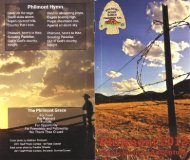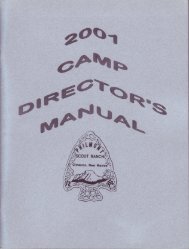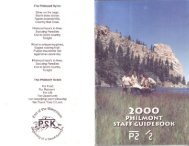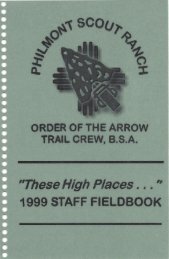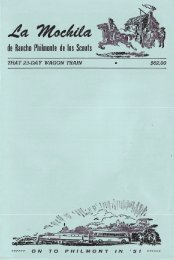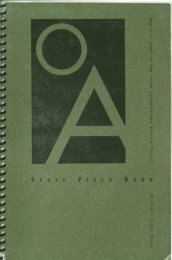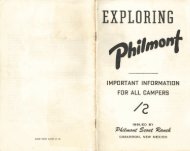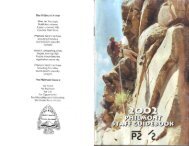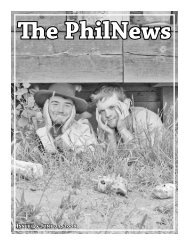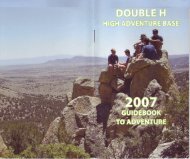Guidebook 2008.pdf
Guidebook 2008.pdf
Guidebook 2008.pdf
Create successful ePaper yourself
Turn your PDF publications into a flip-book with our unique Google optimized e-Paper software.
Protection from Hantavirus<br />
Hantavirus is thought to be the cause of respiratory distress syndrome. This<br />
illness has affected persons in most western states. Rodents are the primary<br />
carriers of recognized hantavirus. It is believed that hantavirus is carried<br />
in the urine, feces and saliva of deer mice, rabbits and possibly other wild<br />
rodents. A person contracts hantavirus by coming into contact with rodent<br />
feces, urine, saliva or things that have been contaminated by them. This illness<br />
is not suspected to be spread from one person to another.<br />
All participants and staff engaged in hiking and camping should take the following<br />
precautions to reduce the likelihood of exposure to potentially infectious<br />
materials.<br />
Avoid coming into contact with rodents and rodent burrows or disturbing<br />
dens (such as pack rat nests).<br />
Do not pitch tents or place sleeping bags in areas in proximity to rodent<br />
feces or burrows or near possible rodent shelters (e.g., garbage boxes or<br />
woodpiles).<br />
Do not use or enter cabins or other enclosed shelters that are rodent infested<br />
until they have been appropriately cleaned and disinfected. Report these<br />
to the next staffed camp.<br />
If possible, do not sleep on the bare ground. Use tents with floors.<br />
Store food in a bear bag hung from a cable.<br />
Properly package all garbage and trash, and discard in covered trash containers<br />
at staffed camps.<br />
Use only water that has been disinfected by boiling, chlorination, iodination<br />
or purification for drinking, cooking, washing dishes and brushing teeth.<br />
Accidents<br />
Most accidents occur late in the day in camp, not on the trail. Many of them<br />
involve horseplay. Fatigue, mild dehydration, and altitude effects may impair<br />
a crew member's performance and judgment. Rock throwing, improper use<br />
of equipment, foolishness in hanging bear bags, climbing steep, rocky ridges,<br />
running through campsites, climbing trees, and carelessness around fire lays<br />
are prevalent causes of accidents. To avoid them, individual and crew discipline<br />
should be maintained and safety practiced in all activities.<br />
Stress and Group Dynamics<br />
A ten-day trek in the rugged Philmont terrain sometimes produces mental<br />
and emotional stress, especially for members of crews whose training and<br />
preparation back home has been minimal.<br />
Each crew is subjected to physical demands such as carrying a 35-50 pound<br />
backpack; gasping for breaths at high elevations; facing weather conditions<br />
varying from hot, blazing sun to cold, wet, foggy periods of several days;<br />
and getting started on camp chores early and doing them efficiently to participate<br />
in programs at the next staffed camp. These physical demands can<br />
create irritability and mental stress.<br />
32<br />
Personality differences and minor internal crew conflicts sometimes produce<br />
emotional stress. Each crew member should ask, how can I eliminate or<br />
reduce my habits that may be offensive to others? Good leadership on the<br />
part of the Crew Leader can help reduce the potential for conflicts. The Crew<br />
Leader should I) discuss alternative choices with the crew, 2) listen to each<br />
crew member's ideas, 3) make decisions in the best interest of the entire<br />
crew, 4) assign duties to implement those decisions, 5) evaluate how the<br />
crew did with input from each individual. Giving objective feedback based<br />
on observed behaviors rather than directing it to a specific person or persons<br />
can be extremely beneficial in resolving conflicts.<br />
If stress is beyond the capabilities of the crew to manage, contact the nearest<br />
staffed camp for help. Depending upon the circumstances, a camp director or<br />
Philmont chaplain may be called in to assist. If a serious conflict develops, a<br />
camp director or chaplain has better success in helping the crew overcome it<br />
when called early, instead of allowing it to escalate.<br />
Purify All Drinking Water<br />
All water from all sources-including springs, streams and wells-must be<br />
purified.<br />
The most certain treattnent to purify water is to heat it to a rolling boil.<br />
Philmont provides Micropur tablets that release chlorine-dioxide that is<br />
effective to kill waterborne bacteria and viruses that cause disease.<br />
Philmont recommends that you use a purifier. (Purifiers remove giardia,<br />
bacteria, cryptosporidia and viruses - filters do not remove viruses.) If using<br />
a filter you must also use additives or boiling to kill all viruses. You must<br />
bring extra cartridges and spare parts.<br />
Dishwashing Procedure<br />
After each meal scrape and wipe dishes, utensils and pots as clean as possible<br />
using toilet paper. Wash using a mild, biodegradable soap in warm water. Use<br />
scrub pads to remove hardened food remains. Rinse them in boiling water.<br />
Before each meal sterilize dishes, utensils and pots for at least 30 seconds in<br />
boiling water. This disinfects any contamination from being in a pack.<br />
Dishes and utensils will air dry quickly in Philmont's low humidity. Wash<br />
your dishes near a sump, not a water spigot which may contaminate the area.<br />
Proper washing, rinsing and sterilizing of dishes and utensils will prevent<br />
diarrhea, dysentery and a host of other medical problems.<br />
Use of Sumps<br />
When disposing of waste water, drain it through a strainer provided by<br />
Philmont. The water should be disposed of in a provided sump or at least<br />
200 feet, from any campsite or water source. Solid matter should be carried<br />
to the next staffed camp.<br />
33



